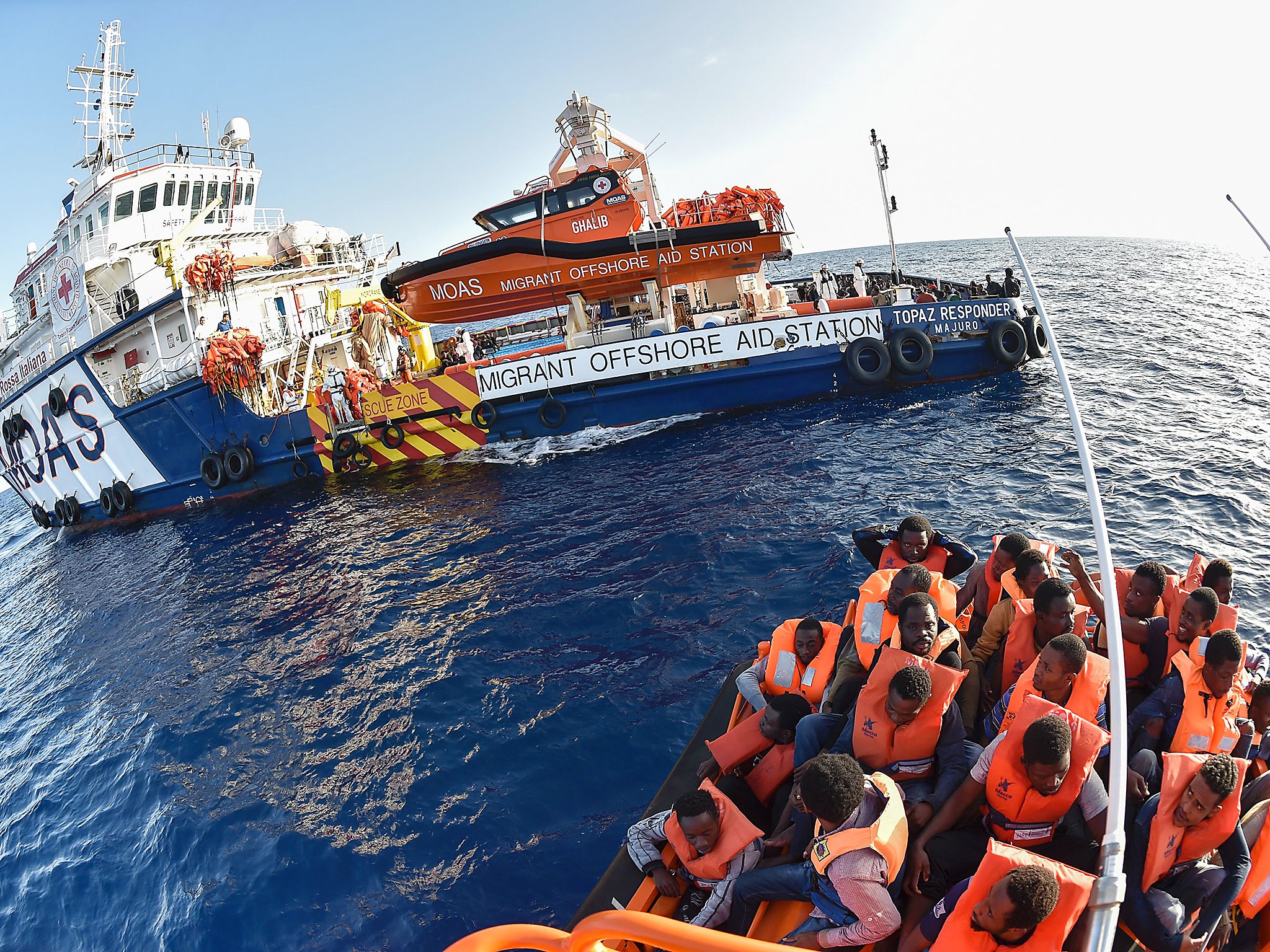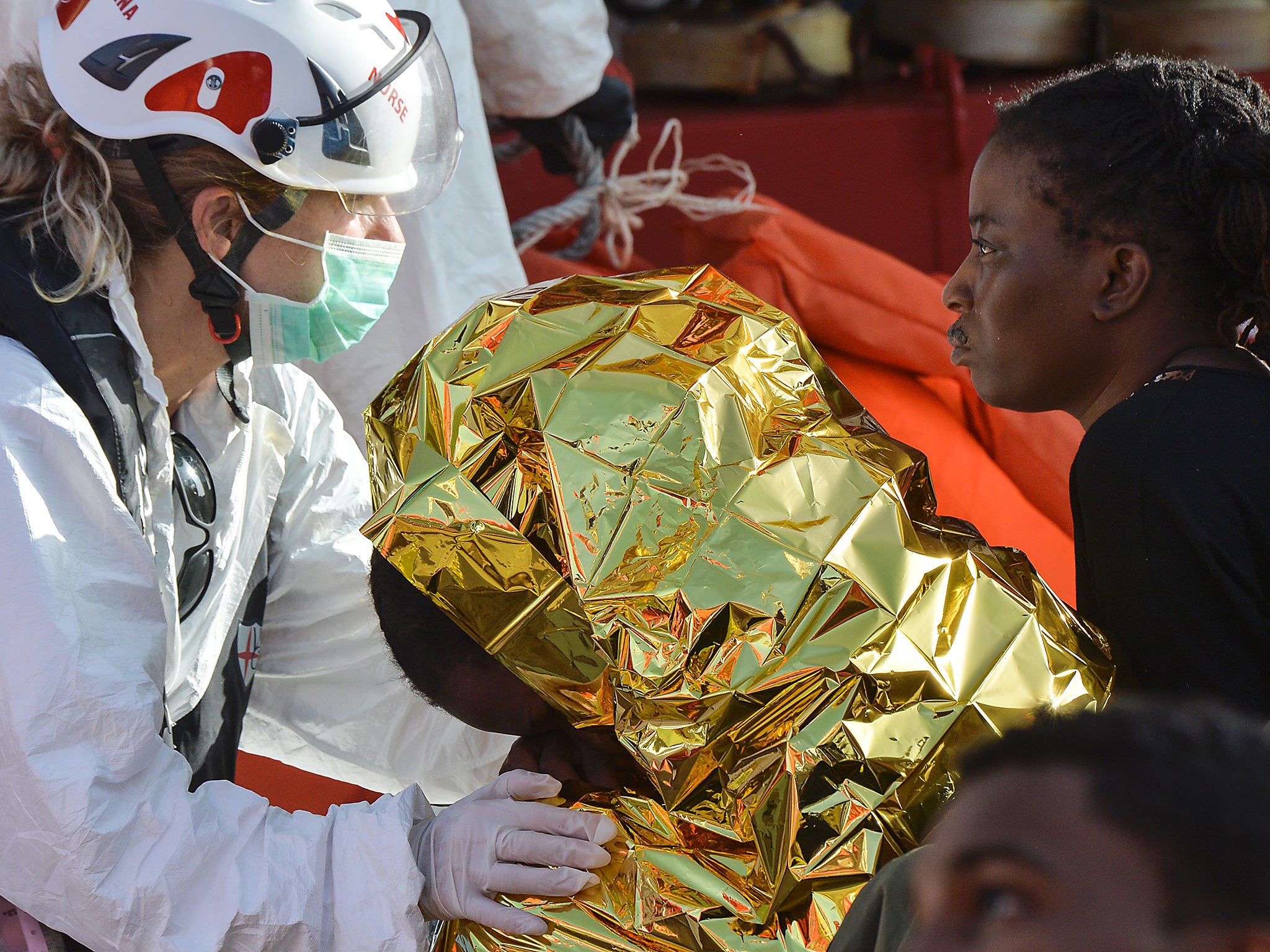Babies among more than 200 refugees drowned boat disasters in the Mediterranean Sea
Tragedies push known deaths in the Mediterranean to more than 4,000 for 2016

Your support helps us to tell the story
From reproductive rights to climate change to Big Tech, The Independent is on the ground when the story is developing. Whether it's investigating the financials of Elon Musk's pro-Trump PAC or producing our latest documentary, 'The A Word', which shines a light on the American women fighting for reproductive rights, we know how important it is to parse out the facts from the messaging.
At such a critical moment in US history, we need reporters on the ground. Your donation allows us to keep sending journalists to speak to both sides of the story.
The Independent is trusted by Americans across the entire political spectrum. And unlike many other quality news outlets, we choose not to lock Americans out of our reporting and analysis with paywalls. We believe quality journalism should be available to everyone, paid for by those who can afford it.
Your support makes all the difference.Three babies are among more than 200 refugees killed in two disasters off the coast of Libya as Europe’s attention focuses on a landmark legal ruling on Brexit.
The tragedies push the known number of asylum seekers who have died attempting to reach Europe this year to more than 4,000, with 2016 now officially the deadliest year on record.
Carlotta Sami, a spokesperson for the UN Refugee Agency (UNHCR), announced on Thursday that at least 239 migrants had died in two shipwrecks.
She said the information was confirmed by two of the 31 survivors brought ashore on the Italian island of Lampedusa, who said their boats overturned in rough seas.
An information bulletin given to search and rescue boats by Italian commanders said one rubber boat capsized off the coast of Libya on Wednesday morning while carrying more than 120 people.
Survivors from one dinghy, whose passengers included about 20 women and six children all believed to be from West Africa, said they set off from Libya at about 3am local time (5am GMT) on Wednesday. The boat sank a few hours into its journey.
A commercial ship and the Siem Pilot, operated by EU border agency Frontex, were among those deployed and rescued almost 30 survivors but up to 100 passengers were feared to have drowned. Twelve bodies were recovered, including three babies.

During the search for victims, another vessel operated by Save the Children found two women swimming in the sea who said they had been on another boat that capsized, killing 120 people.
Survivors, mostly from Guinea and Nigeria, were transferred to an Italian navy vessel and taken to Lampedusa, with two evacuated for urgent medical treatment.
Boats continued to launch from Libya on Thursday after a spell of rough seas delayed departures for several days.
More than 760 people were rescued from five rubber boats and a small wooden vessel in a series of operations in the search and rescue zone off Libya's coast.
Sasha Nicholl, a spokesperson for Save the Children, told The Independent the discovery of the two women was a rare moment of hope in a “horrific 24 hours in the Mediterranean”.
She said rescuers arrived at an overcrowded dinghy on Thursday to find one of more than 100 passengers had died.
“Tragically, one mother had already dead when we arrived on the scene,” she added. “Her two very young children - who have no other relatives with them - are now being looked after by our specialist child protection team.”
The latest tragedies push the International Organisation for Migration’s count of deaths in the Mediterranean Sea to 4,220 so far this year.
The Red Cross, which is funding joint search and rescue operations with the Migrant Offshore Aid Station (MOAS), condemned political inaction in Europe.
Mike Adamson, chief executive of the British Red Cross said: “This is a humanitarian crisis and regardless of why people are making the journey, no one deserves to die in this way.
“The Red Cross is present along the entire migratory route and we have seen first-hand the horrors people endure just to get somewhere safe.
“This will not end until Europe’s politicians are able to offer better protection, including more legal routes for refugees to reach a place of safety. Until then, all we can do is continue to rescue as many people as we can from a truly horrific and terrifying death.”
A joint report by British universities and specialists in Malta, Italy and Greece, has found that Europe’s response to the crisis has failed to tackle people smuggling and possibly worsened deaths.
Professor Heaven Crawley, an author from Coventry University’s Centre for Trust, Peace and Social Relations (CTPSR), told The Independent that politicians have been “wantonly ignoring” the reality of the crisis to maintain ill-informed government positions.
“The problem is there’s a huge political agenda around migration, so more pragmatic or effective alternatives are being overridden by political aspirations of leaders across the EU,” she said.
“They’ve backed themselves into a political corner where it’s very difficult to do anything else.”
The UK is part of the EU’s Operation Sophia mission, seeing ships patrol the Libyan coast for surveillance and rescue any boats in distress.
The move has driven a shift towards smaller and less seaworthy boats by people smugglers hoping to evade detection, driving a rise in death rates in the Central Mediterranean – now the deadliest sea crossing in the world.
Just over a quarter of the 332,000 migrants to have arrived by sea in Europe so far this year are Syrian, followed by Afghans, Iraqis, Nigerians, Eritreans and numerous other nationalities from the Middle East, Africa and Asia.
Join our commenting forum
Join thought-provoking conversations, follow other Independent readers and see their replies
Comments